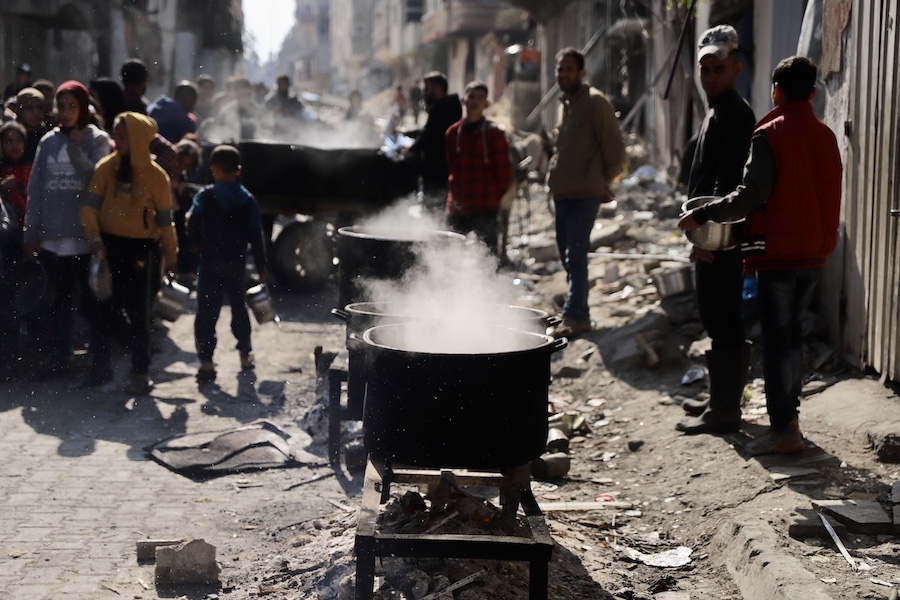Airstrikes and politics, blockades and logistics are complicating the transport of humanitarian aid to Gaza — with desperate aid groups at times relying on donkey carts to move essential supplies.
Aid organizations say they are frustrated by the effect of Israel’s control of movement and trade, intensified by airstrikes and blockades, on essential supplies since the bombardment of Gaza began shortly after Hamas’s Oct. 7, 2023, attack on Israel.
You may unsubscribe from any of our newsletters at any time.
On that day, Hamas militants attacked communities in southern Israel, killing 1,200 mostly civilians and taking about 250 hostages back to Gaza, according to the Israeli government. The government believes 130 hostages remain in Gaza, with 31 killed in the bombing. The death toll in Gaza since Israel’s bombardment began has hit 30,000, with more than 70,000 wounded, Gaza’s health ministry reported.
The conflict is leaving thousands in Gaza without food, water and shelter, and the region’s traumatized children needing support. Many trucks are lined up at the Egyptian border with Gaza, unable to cross with the needed goods.
On Feb. 29, Israeli soldiers fired at crowds waiting for aid, according to Gaza health officials. The Israeli military said its forces shot people who posed a threat to the army as crowds stormed aid trucks. They said the stampede caused most of the estimated 100 deaths, but local health officials said the wounded and dead in the hospital were hit by heavy-calibre bullets.
The United Church of Canada’s aid efforts are funnelled through Action by Churches Together (ACT), a coalition of international faith-based groups, which collaborates with aid organizations to provide long-term development, advocacy and humanitarian assistance. ACT is trying to provide essential goods to Palestinians in Gaza.
George Majaj, ACT’s humanitarian program adviser for Middle East and North Africa (MENA), noted: “We face several challenges that include lack of food, clean water, health services and damaged infrastructure. Our members’ offices are destroyed or used as shelters. Active conflict poses security risks and limits movement.”
Save the Children Canada, one of the aid groups ACT works with, faces the same challenge. The organization provides emergency food assistance, clean water, hygiene kits, thermal blankets and emotional support to displaced children and families, both in designated shelters and households across Gaza.
“Our ability to deliver aid to Gaza is severely restricted by the closure of key border crossings and inspections by Israel authorities, limiting the entry of vital aid,” said Dalia Al Awqati, the organization’s head of humanitarian affairs.
More on Broadview:
- Imagining a Middle East where love and hope flourish
- A new book by Palestinian and Jewish community leaders encourages meaningful dialogue on Israel-Palestine
- United Church condemns violence by Hamas and Israel and calls for ceasefire
Canadian Foodgrains Bank, another ACT partner in the region, is a faith-based organization that provides food, supplies, resources for farmers such as training, money, seeds, fertilizers, tools and emergency relief. It is also struggling to keep up with the demands for aid.
“We purchase food supplies like rice, flour and beans in Jordan and then transport them through Israeli border crossings where they undergo inspection. We’ve experienced a delay of up to 10 days for our truck to be allowed entry into Gaza, even after obtaining the necessary approvals,” said Stefan Epp-Koop, senior humanitarian manager at Canadian Foodgrains Bank.
“At times, we’ve resorted to using donkey carts to transport aid within Gaza,” Epp-Koop added.
Alongside the logistical problems, aid organizations are facing complications in getting money to their partners in Gaza. Majaj said sending money to Gaza can be difficult as Israel’s long-standing restrictions prevent direct donations to local aid groups. Also, only the Bank of Palestine is operating in Gaza so ACT has turned to alternative methods, such as PayPal, for paying vendors.
Rev. Japhet Ndhlovu, executive minister for the church in mission of The United Church of Canada, says the United Church ensures transparency and accountability in the use of donations collected from members by conducting monitoring and evaluation visits.
On Jan. 26, Canada and other nations suspended funding to UNRWA due to allegations that about a dozen employees of the 13,000-strong workforce took part in the Oct. 7, 2023, terrorist attack against Israel.
“UNRWA has the warehouses, trucking capacity and workforce, which are needed to transport and distribute aid across Gaza. Because supplies are already ordered and paid for, it may not have an immediate impact, but if it does not get the money pledged [by countries, including Canada], it will worsen the humanitarian crisis,” said Majaj.
ACT issued a statement Feb. 5, calling on all nations to reverse their decision to stop funding UNRWA. The suspension of funds also places significant pressure on other aid groups to do more with limited financial resources.
ACT works with the Egyptian Red Crescent to transport supplies into Gaza and with the Jordanian government to airdrop medical supplies into the region. However, Majaj says it’s still not enough.
“Markets are depleted, prices have skyrocketed and access to basic necessities such as clean water and electricity has become difficult. Health-care services are overwhelmed because clinics can’t operate at full capacity,” said Majaj.
Ndhlovu agrees and calls on the world to come together and make a difference in the lives of those affected by the conflict.
***
M. L. Witkowicz is a writer based in Toronto, Ont.













